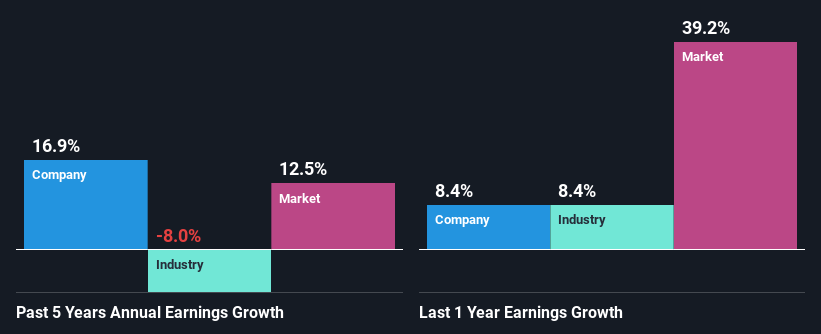Dollar General Corporation's (NYSE:DG) Stock Been Rising: Are Strong Financials Guiding The Market?
Dollar General's (NYSE:DG) stock up by 4.1% over the past week. Since the market usually pay for a company’s long-term financial health, we decided to study the company’s fundamentals to see if they could be influencing the market. In this article, we decided to focus on Dollar General's ROE.
ROE or return on equity is a useful tool to assess how effectively a company can generate returns on the investment it received from its shareholders. Put another way, it reveals the company's success at turning shareholder investments into profits.
See our latest analysis for Dollar General
How Is ROE Calculated?
The formula for ROE is:
Return on Equity = Net Profit (from continuing operations) ÷ Shareholders' Equity
So, based on the above formula, the ROE for Dollar General is:
41% = US$2.5b ÷ US$6.1b (Based on the trailing twelve months to July 2021).
The 'return' refers to a company's earnings over the last year. One way to conceptualize this is that for each $1 of shareholders' capital it has, the company made $0.41 in profit.
What Has ROE Got To Do With Earnings Growth?
We have already established that ROE serves as an efficient profit-generating gauge for a company's future earnings. Depending on how much of these profits the company reinvests or "retains", and how effectively it does so, we are then able to assess a company’s earnings growth potential. Assuming all else is equal, companies that have both a higher return on equity and higher profit retention are usually the ones that have a higher growth rate when compared to companies that don't have the same features.
Dollar General's Earnings Growth And 41% ROE
To begin with, Dollar General has a pretty high ROE which is interesting. Secondly, even when compared to the industry average of 19% the company's ROE is quite impressive. This probably laid the groundwork for Dollar General's moderate 17% net income growth seen over the past five years.
Next, on comparing with the industry net income growth, we found that the growth figure reported by Dollar General compares quite favourably to the industry average, which shows a decline of 8.0% in the same period.
The basis for attaching value to a company is, to a great extent, tied to its earnings growth. What investors need to determine next is if the expected earnings growth, or the lack of it, is already built into the share price. This then helps them determine if the stock is placed for a bright or bleak future. Has the market priced in the future outlook for DG? You can find out in our latest intrinsic value infographic research report.
Is Dollar General Efficiently Re-investing Its Profits?
In Dollar General's case, its respectable earnings growth can probably be explained by its low three-year median payout ratio of 17% (or a retention ratio of 83%), which suggests that the company is investing most of its profits to grow its business.
Additionally, Dollar General has paid dividends over a period of seven years which means that the company is pretty serious about sharing its profits with shareholders. Our latest analyst data shows that the future payout ratio of the company over the next three years is expected to be approximately 18%. As a result, Dollar General's ROE is not expected to change by much either, which we inferred from the analyst estimate of 40% for future ROE.
Summary
Overall, we are quite pleased with Dollar General's performance. Specifically, we like that the company is reinvesting a huge chunk of its profits at a high rate of return. This of course has caused the company to see substantial growth in its earnings. With that said, the latest industry analyst forecasts reveal that the company's earnings growth is expected to slow down. To know more about the latest analysts predictions for the company, check out this visualization of analyst forecasts for the company.
This article by Simply Wall St is general in nature. We provide commentary based on historical data and analyst forecasts only using an unbiased methodology and our articles are not intended to be financial advice. It does not constitute a recommendation to buy or sell any stock, and does not take account of your objectives, or your financial situation. We aim to bring you long-term focused analysis driven by fundamental data. Note that our analysis may not factor in the latest price-sensitive company announcements or qualitative material. Simply Wall St has no position in any stocks mentioned.
Have feedback on this article? Concerned about the content? Get in touch with us directly. Alternatively, email editorial-team (at) simplywallst.com.


